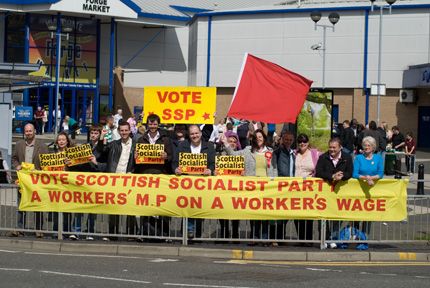CWI
Ireland: United Left Alliance's electoral challenge strengthens

January 16, 2011 -- United Left Alliance -- The challenge of the United Left Alliance to the right-wing consensus in Irish politics is strengthening rapidly. As of today, a total of 17 constituencies will be contested by 18 ULA candidates in the looming general election. As well as Tipperary South and West Waterford, 11 constituencies in Dublin, two in Cork, as well as Wexford and Limerick city, candidates have been nominated for Carlow/Kilkenny and Laois/Offaly. This means that almost 50% of Dáil [parliamentary] constituencies will have a left alternative to the establishment political parties.
Joe Higgins MEP of the Socialist Party said:
It is entirely possible that this number will be extended in the coming weeks but even at the current number, it is the first time in Irish politics that there was such a wide representation of principled left candidates presented to the electorate in a general election.
Ivory Coast: Behind the post-election political crisis and threat of military intervention
Ivorians protest against food price increases in 2008.
By Peluola Adewale
Jannuary 5, 2011 -- Democratic Socialist Movement (Nigeria) -- That the November 28, 2010, run-off election in the Ivory Coast has produced two presidents – Alassane Ouattara and Laurent Gbagbo – is not a surprise, though working people had expected the election to usher a return of peace. The country has been divided into two since the 2002 coup attempt and subsequent rebellion, with each half effectively having its own de facto government. The north is controlled by rebels, Forces Nouvelles (New Forces), while the south is under Gbagbo with the support of the armed forces and youth militia. Therefore, on this account and with the ethnocentric sentiment that has characterised Ivorian politics in the last two decades, it is natural that the results of the election from either half would be bitterly disputed by the party declared the loser of the contest.
The United Left Alliance in Ireland: Is this the left unity we were hoping for?

Richard Boyd Barrett from the People Before Profit Alliance and Joe Higgins MEP fr
South Africa: Workers' factory takeover to defend jobs enters second month
November 17 video made by Workers' World Media, Cape Town.
Scottish Socialist Party: ‘Little Britain’ politics and the left

By Alan McCombes
April 24, 2009 -- Voters who want an isolationist Britain will be spoiled for choice in the European elections on June 4th. On the far right, the BNP and UKIP both demand an independent Britain. Left of centre parties that want British withdrawal include Arthur Scargill’s Socialist Labour Parry and the NO2EU Yes To Democracy coalition. While these four parties promote British independence, the Free Scotland Party campaigns for an independent Scotland outside the European Union.
What should be the attitude of Scottish socialists towards Europe? Should the left back British separatism? And does the NO2EU Yes To Democracy campaign represent a progressive step forward?
Nigerian socialist: A tribute to Fidel Castro
Kola Ibrahim of the Democratic Socialist Movement of Nigeria looks at the legacy of Fidel Castro, the internationalisation of struggle and calls for ``working-class activists from Kenya to Venezuela to Georgia to Pakistan and the rest of the world'' to build a genuine working people's political platform.
Some more comments on Peter Taaffe's Cuba book
[This article first appeared in the Democratic Socialist Party's internal discussion bulletin The Activist - Volume 10, Number 9, October 2000.]
The following article was written at the request of Farooq Tariq, general secretary of the Labour Party Pakistan, as an initia
Broad parties and narrow visions: the SWP and Respect
By Murray Smith
January 4, 2008 -- The crisis which has led to a split in Respect is an important development, affecting as it does the principal force of the radical left in England. The future will tell us whether the current crisis represents just another failure, another dead-end, another missed opportunity for the English left, or whether, as seems increasingly possible, it offers Respect itself the chance for a renewal and is perhaps a step on the road towards a broader formation.
Whichever way you look at it, the Socialist Workers’ Party (SWP) is at the centre of the crisis. It is or was the central component of Respect, as it had been of the Socialist Alliance which preceded it, and it has been one of the main protagonists in the conflict that has engulfed Respect. So I want to look at what has happened from the point of view of the relationship between the SWP, a traditional far-left organisation, and the broader left formation that Respect is. I think there are some lessons to be learned which go beyond Britain.
Phil Hearse came into politics through the Campaign for Nuclear Disarmament and subsequently joined the Young Communist League in 1962 at the age of 13. He was expelled in 1963 for being a member of a "Trotskyist-led faction". From 1967, he was for 27 years a member of the British section of the Fourth International, before joining Militant Labour in 1994. After three years he left with a small group to help found Socialist Democracy.
Internationalism and international links
By Murray Smith